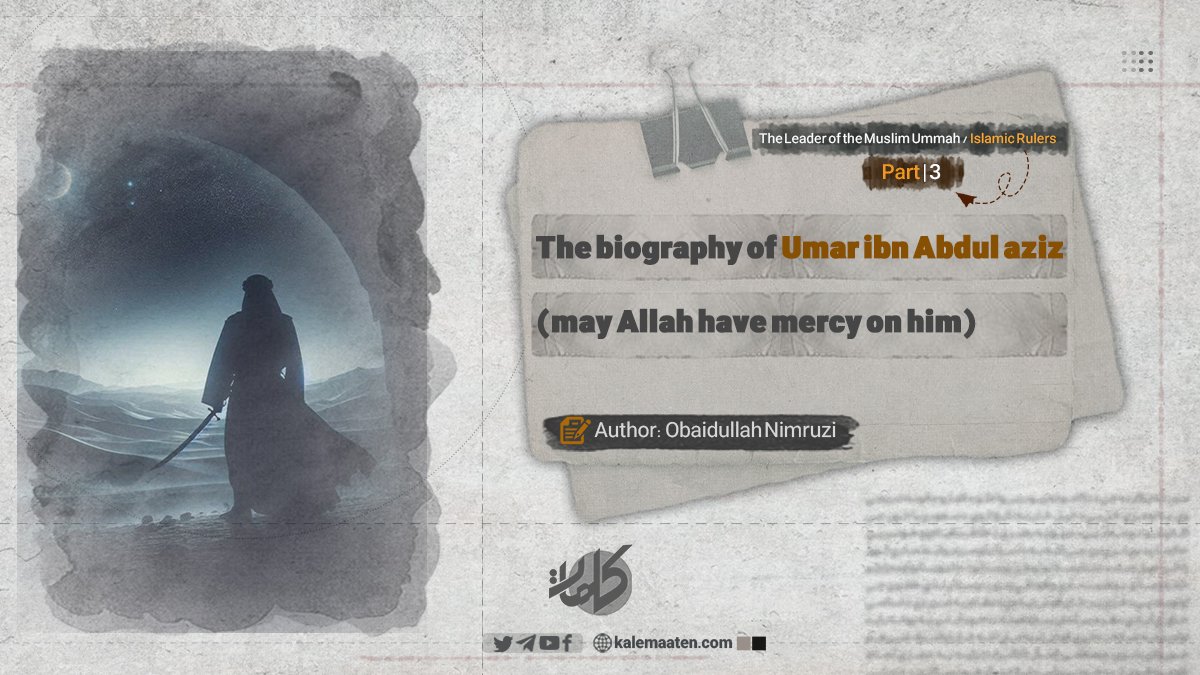
Author: Obaidullah Nimruzi
The Biography of Umar ibn Abdul Aziz ‘May Allah Have Mercy on Him’ (Part Three)
Lack of Reformers and Inviters in the History of Other Religions
In other religions, including heavenly ones, there has not been the presence of privileged individuals who can bring a new spirit into their faith and inspire the followers of that religion. In the history of various religions, despite the passage of hundreds and thousands of years, this vacuum is evident. During this time, no significant reform movement has emerged to save the religion from distortions and heresies, nor to reveal the truth of their faith. There has been a lack of individuals willing to take on the responsibility of proclaiming the truth of belief and the principles of their religion with conviction and emotion. They should raise a strong banner against new rituals and innovations, combat materialism and egoistic tendencies, and fight for the reformation and restoration of their faith through certainty, pure spirituality, and self-sacrifice among their followers.
A prominent example of this situation is Christianity. At the beginning of its emergence, particularly in the first half of the first century, it fell victim to such distortions that are rare in the history of other religions. We see how Christianity transformed from its initial bright and simple monotheistic form into a version resembling pagan beliefs, evolving into a collection of Greek thoughts and Buddhist ideas. This transformation can largely be attributed to the influential figure known as Paul of Tarsus (10-65 AD), whose reforms represent a significant deviation from the original message of Jesus, moving from one essence to another and shifting from one system to an entirely different one. In this new iteration, only the names and some minor rituals of early Christianity remained.
Christian writer Eruse De Bunsen notes these changes, stating: “The beliefs and systems mentioned in the Bible were not promoted by Jesus in his words or actions. The differences between Christians, Jews, and Muslims today are not due to the actions of Jesus Christ (Hazrat Esa); rather, they are the results of the actions of that Christian-looking, atheistic Jew. These differences stem from the rituals, allegories, and prophecies that emerged.” He further argues that Paul, while imitating Stephen—a proponent of the Essene religion—combined numerous Buddhist rituals with the teachings of Jesus Christ. Today’s contradictory narratives found in the Bible that undermine the mission of the Prophet (peace be upon him) are, according to him, inventions of Paul and later scholars and monks, who established superstitions that laid the foundations of Christianity for eighteen centuries.
Christianity has preserved the spirit of Paul and his legacy for many centuries, and even in modern times, no one has emerged in the Christian world to challenge falsehood and strive to return to the original essence of the faith. After centuries, no reformer or call to action has been able to separate foreign elements from the core of Christianity.
Finally, in the 15th century, Martin Luther emerged in Germany, making brief and minor reforms to some aspects of Christianity. However, these reforms were neither fundamental nor comprehensive, and he did not confront the distorted shape of Christianity or its deviations. It appears that the history of Christianity has been devoid of substantial revolutions or successful reformation movements until fifteen centuries after the mission of Prophet Muhammad. During this period, no significant movements or individuals with such characteristics arose in the Christian world to achieve meaningful success in reforming or revitalizing Christianity.
British Encyclopedia columnist J. Bassmullinger notes: “If we explore the reasons why religious reform activities were largely unsuccessful before the 16th century, we can unequivocally say that the primary reason was the intellectual enslavement of the medieval mind to past allegories.” He also states, “The failures of comprehensive reformation efforts within the Church and the ineffectiveness of their ongoing activities are undeniable facts in the history of Europe.” He points out that before the 16th century, attempts to reform religion were met with condemnation from the Church. After Luther, no other individual successfully rose against the superstitions and oppression of the Church, equal in stature and resolve to Luther himself. Thus, Christianity continued on a path that it had chosen, or that had been imposed upon it by force; the Church’s influence waned until its power was completely lost.
In Europe, materialism emerged as a dominant force, relegating religion further to the background. No individual akin to Luther emerged in Christianity to confront this materialism, to restore the original tenets of the faith in the minds of Christians, and to inspire moral fortitude and conviction that could withstand the winds of materialism. This absence of a unifying voice limited Christianity’s ability to respond to contemporary questions and challenges effectively.
A similar story unfolded in other Eastern religions. Indian spirituality also deviated from its original path, losing its simplicity and direct connection to the Creator. Moral integrity diminished, leading the religion to become merely a theoretical construct, which eventually led to an increase in skepticism and distrust. The vital principles of monotheism and equality in interpersonal transactions were gradually overlooked, undermining the foundational strength of the religion. The founders of the “Upanishads” made considerable efforts to counter this corruption by rejecting prevailing rituals and instead proposing a philosophical system based on consensus in plurality. This new form was accepted within certain scholarly circles of Indian spirituality due to their focus on the unity of existence. However, the general populace, with lower intellectual engagement and a desire for practical teachings, rejected this philosophy. The emergence of such tensions ultimately weakened the influence and strength of Hinduism, leading to increased mistrust and insecurity, which later gave rise to Buddhism prior to the 6th century AD.
Continues…


